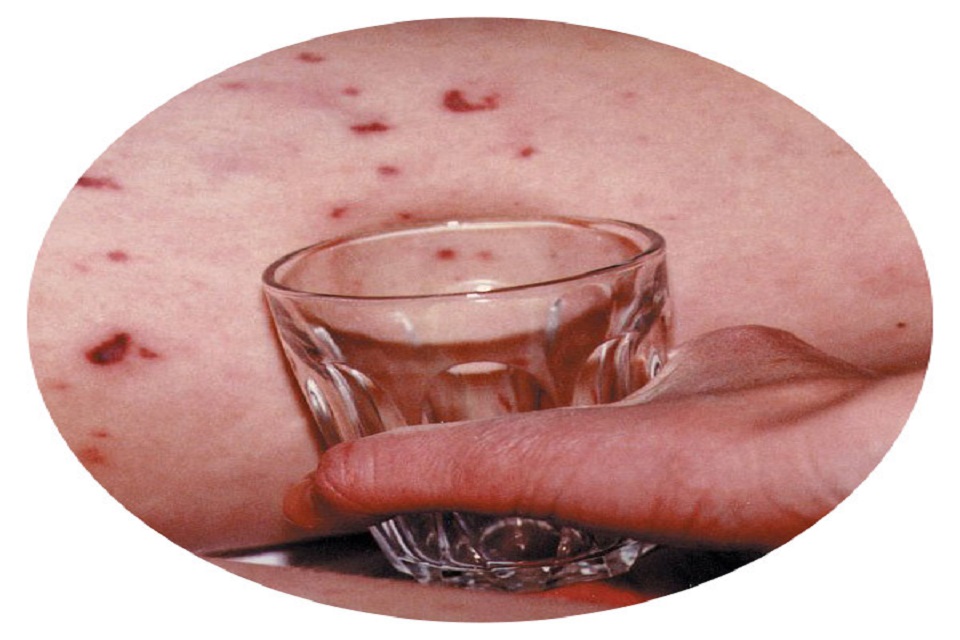Meningitis: don't ignore the signs and symptoms
Updated 27 September 2023
Applies to England
Make sure you, your family and your friends look out for each other and that someone knows if you are unwell so they can keep an eye on you. This could be life-saving.
Be aware, be prepared
Meningococcal meningitis (inflammation of the lining of the brain and spinal column) and septicaemia (blood poisoning) are rare but severe diseases that can kill or leave people with life changing disabilities and health problems. Both meningitis and septicaemia can lead to sepsis. Teenagers, and university students in particular, are at increased risk.
How meningitis is spread
The bacteria that cause these diseases are usually spread by close or lengthy contact. Most cases happen individually but outbreaks sometimes occur in schools or where people share living space, such as university halls.
Protect yourself with MenACWY vaccine
Most UK teenagers and young adults born from September 1996 will have been offered MenACWY vaccine whilst at school but they remain eligible up to their 25th birthday. Overseas students entering a UK university for the first time who have not had MenACWY vaccine are also eligible up to their 25th birthday.
If you fit either of these groups and have not yet had the vaccine book an appointment with your GP practice now. If you are unsure discuss this with your GP practice. MenACWY vaccine is very effective at preventing meningococcal meningitis and septicaemia caused by MenA, MenC, MenW and MenY. But remember that this vaccine can’t prevent all forms of meningitis and septicaemia. So it is very important that you are aware of the signs and symptoms.
See further information for details of the MenACWY vaccination programme.
Signs and symptoms
Many of the early signs – vomiting, fever, aches, general tiredness and headaches – are also signs of less serious illnesses like colds and flu. But someone with meningitis or septicaemia will usually become seriously ill in a matter of hours. This is why it is very important to keep checking someone who is ill so you know if they are getting rapidly worse and to keep looking for signs and symptoms.
Seek medical help urgently if you become concerned about their or your own health. It’s important too to look for cold hands and feet, severe limb pain and pale and blotchy skin, as these tend to develop early in the illness.
Symptoms such as a rash that doesn’t fade (do the glass test), being confused or delirious, or too sleepy to wake occur later and are very serious – seek help immediately.
For meningitis, the most important signs to look out for are:
-
fever
-
a very bad headache (this alone is not a reason to get medical help)
-
vomiting
-
stiff neck
-
dislike of bright lights
-
rash
-
confusion, delirium
-
severe sleepiness, losing consciousness
-
seizures
For septicaemia, the most important signs to look out for are:
-
fever and shivering
-
severe pains and aches in limbs and joints
-
vomiting
-
very cold hands and feet
-
pale or blotchy skin
-
rapid breathing
-
diarrhoea and stomach cramps
-
red or purple ‘bruised’ or blotchy rash on skin that do not fade under pressure – do the glass test. On dark skin, check inside the eyelids or roof of the mouth where the spots may be more visible
-
difficulty walking or standing
-
severe sleepiness, losing consciousness
What you should do
Not all of these symptoms will develop and they can appear in any order and be mixed between the 2 illnesses. Meningococcal disease can be hard to identify at first because it can be like a bad case of flu.
However, anyone affected with meningococcal disease will usually become seriously ill within a few hours. You should contact your GP (family doctor) or NHS 111 for advice if you have any concerns about your own or a friend’s health.
If you become worried about yourself or a friend, particularly if symptoms are getting worse, seek medical help urgently at the closest emergency department or by dialling 999. Early treatment can be life-saving.
The glass test
Press the side of a clear drinking glass firmly against the rash so you can see if the rash fades and loses colour under pressure. If it doesn’t change colour, contact your doctor immediately.
On dark skin, check inside the eyelids or roof of the mouth where the spots maybe more visible.

For more information on meningitis please visit:
-
Information on the MenACWY vaccination from .GOV.UK
-
Information on the MenACWY vaccination from NHS.UK
-
The Meningitis Research Foundation, free helpline 0808 80 03 344
-
Meningitis Now, 24 hour helpline 0808 80 10 388
-
Meningitis symptoms from NHS.UK
This leaflet in alternative formats
This leaflet is available translated into the following languages for order and download: Albanian, Arabic, Bengali, Bulgarian, Chinese (simplified), Chinese (traditional), Estonian, Farsi, French, Greek, Gujarati, Hindi, Italian, Latvian, Lithuanian, Nepali, Panjabi, Pashto, Polish, Portuguese, Romanian, Romany, Russian, Somali, Spanish, Tagalog, Tigrinya, Turkish, Twi, Ukrainian, Urdu and Yoruba.
Please visit Health Publications to order your copies today or call 0300 123 1002.
